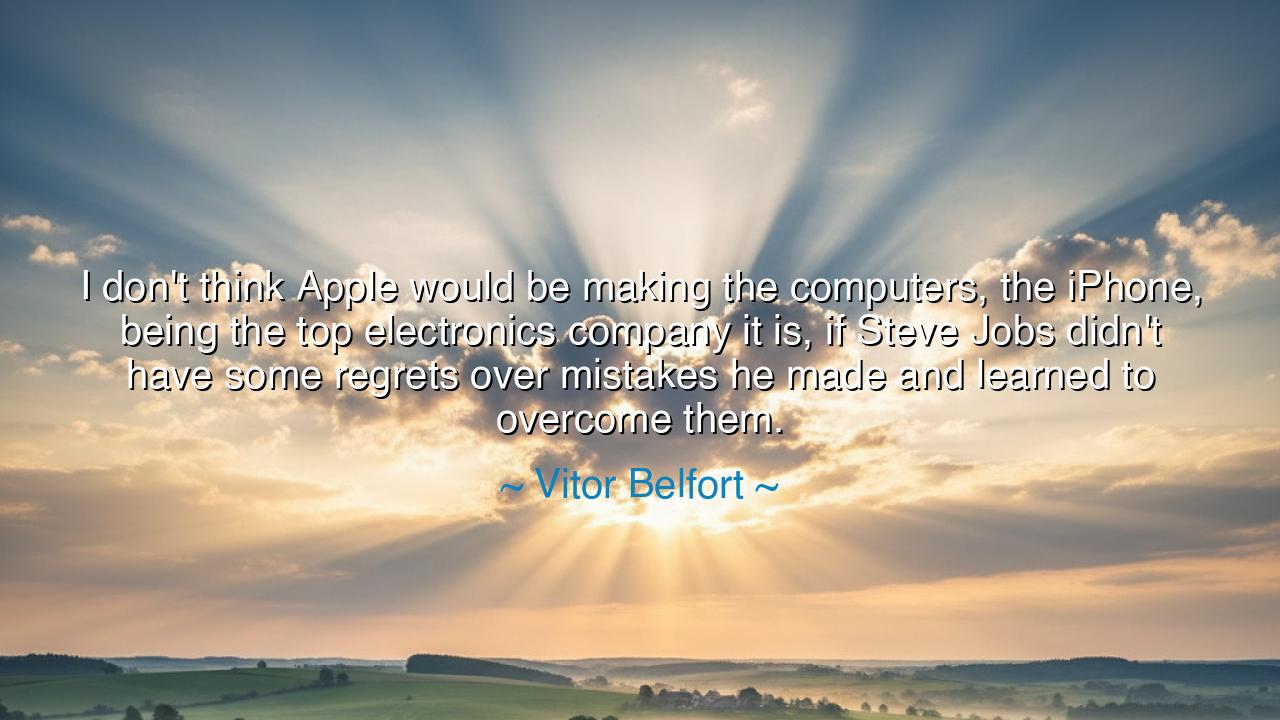
I don't think Apple would be making the computers, the iPhone
I don't think Apple would be making the computers, the iPhone, being the top electronics company it is, if Steve Jobs didn't have some regrets over mistakes he made and learned to overcome them.






The words of Vitor Belfort—“I don't think Apple would be making the computers, the iPhone, being the top electronics company it is, if Steve Jobs didn't have some regrets over mistakes he made and learned to overcome them.”—resonate as a meditation on the timeless power of reflection, resilience, and growth. Beneath the modern veneer of technology and innovation lies an ancient truth: greatness is seldom born from perfection, but from the courage to acknowledge errors, to learn, and to rise again. Belfort reminds us that even the most transformative figures—like Jobs—were shaped as much by their missteps as by their triumphs.
In this reflection, we see the duality of human endeavor: the brilliance of creation is inseparable from the lessons of failure. Steve Jobs, like the heroes of old, faced setbacks, betrayals, and moments of self-doubt. Yet it was in confronting these regrets, in examining his own flaws, that he discovered new pathways to vision, creativity, and leadership. Belfort’s words illuminate the truth that mistakes are not signs of weakness but seeds of mastery, and that innovation is nourished by the soil of reflection.
The origin of this quote lies in the story of Apple itself, a company whose rise was marked by tumultuous events. Jobs was famously ousted from the company he founded, only to return years later, bringing with him renewed insight and clarity. It was through understanding his prior errors—both in product design and management—that he guided Apple to create revolutionary devices like the iPhone, which transformed the world of technology. Belfort highlights this pattern: the lessons of regret, when embraced, become the scaffolding for achievement.
History is filled with parallels that echo Belfort’s insight. Consider Alexander the Great, whose early campaigns included miscalculations and losses, yet he learned from each and adapted his strategy, ultimately forging an empire that stretched from Greece to India. His brilliance was magnified not by unbroken success, but by the capacity to reflect, correct, and persevere. In the same vein, Jobs’ vision was sharpened by adversity, transforming personal and corporate setbacks into opportunities for innovation and leadership.
There is also a philosophical dimension in Belfort’s reflection: the reconciliation of pride and humility. To acknowledge mistakes is to confront one’s ego and to cultivate wisdom. Ancient thinkers like Confucius and Seneca taught that self-examination is the path to virtue; without it, ambition becomes vanity. Jobs’ journey exemplifies this principle—his ability to learn from regrets allowed him to balance confidence with discernment, creativity with practicality, and vision with execution.
The lesson here is both timeless and practical: greatness is not the absence of error, but the courage to learn and improve. Every failure contains insight; every regret holds a lesson. To shun mistakes is to remain stagnant; to embrace them is to grow. Belfort’s words remind us that the most extraordinary achievements often rest upon the foundation of self-awareness and resilience, that the path to innovation is paved with both triumph and trial.
Therefore, let this truth guide our endeavors: reflect upon your errors, confront your regrets, and seek wisdom in the ashes of failure. Like Jobs, like Alexander, like the sages of old, transform missteps into guidance, and setbacks into strategy. The brilliance of your work, the legacy of your life, will be measured not merely by success, but by the depth of learning and growth that each challenge fosters.
And so, my children, remember: perfection is not the mark of greatness, but perseverance is. Let your mistakes illuminate your path, let your regrets shape your character, and let the lessons of failure become the compass guiding you toward triumph. For in the heart of error lies the seed of innovation, and in the willingness to rise again, the soul of true achievement.






AAdministratorAdministrator
Welcome, honored guests. Please leave a comment, we will respond soon